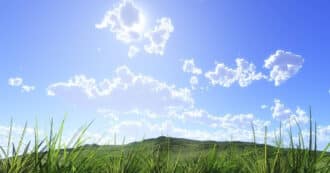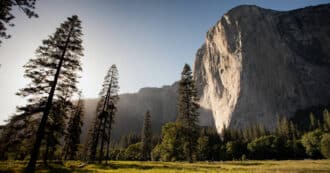The Rev. Dr. Leah D. Schade; leahschade@gmail.com
From the vastness of the cosmos to the tiny, vulnerable chicks, God’s promises both assure and challenge us.
Here are ideas for reading and preaching Genesis 15:1-18 and Luke 13:31-35, assigned for March 13th, 2022, the Second Sunday of Lent in the Revised Common Lectionary. This is part of the EcoPreacher 1-2-3 series to equip pastors and congregations for engaging the Bible through an ecological lens.
Eco-Exegesis
Eco-exegesis is a method of interpreting the biblical text through a green lens using the principles of ecological theology. For this passage, we turn to the Eco Bible, a Jewish ecological commentary on the Hebrew texts.
Elie Wiesel tells a story of a young boy who would skip school to go into the woods. His teacher followed him one day and found him praying in a small, green, circle of trees. When asked what drew him to the woods, he replied, “I can find God there.” “But surely, God is the same in the town as in the woods,” the teacher countered. “That’s true,” the boy replied. “But I am not the same!” The boy grew up to be known as the “Holy Seer of Lublin,” a leading figure in the early Hasidic movement of Poland.
Indeed, being in God’s Creation changes us. It is notable that God in Genesis 15 and Jesus in Luke 13 point to aspects of nature to convey deep truths. In the former, those truths offer reassurance. In the latter, those truths challenge the powerful who threaten the vulnerable. Both texts seek to call out and gather in God’s people together with all Creation.
Genesis 15:5
[God] took [Abram] outside and said, “Look up at the sky and count the stars—if indeed you can count them.” Then God said to him, “So shall your offspring be.” (NIV)
In Genesis, God takes Abram outside. Pause here. God didn’t just show up for Abram randomly. God made it a point to take Abram outside to see the stars. Why? Rabbi Abraham ibn Ezra, a 12th century sage in Spain, wrote poetically of finding God. “Wherever I turn my eyes around on earth or to the heavens, I see You in the field of stars,” Ibn Ezra wrote. “I see You in the yield of land, in every breath and sound, a blade of grass, a simple flower, an echo of Your holy name.”
This story of God promising Abram land and children works on two levels. It assured the original readers of this text who lived through the Babylonian Exile that God’s promises were sure and there was a better future ahead for them. Today, this story assures us that as we live through environmental degradation, God’s promises are still with us and that there is the possibility of a better future ahead. Especially as we live into the covenant of God to protect and preserve both land and the health and wellbeing of children, we will see those promises fulfilled.
Luke 13:34b-35
Jesus said: “How often I have longed to gather your [Jerusalem’s] children together, as a hen gathers her chicks under her wings, and you were not willing. Look, your house is left to you desolate. I tell you, you will not see me again until you say, ‘Blessed is he who comes in the name of the Lord.’” (NIV)
Just as God desired that children thrive in the time of ancient Israel, so did Jesus desire to see the children of his time living without fear from the forces that sought to exploit and harm them. Living within the militaristic Roman empire, Jesus described himself as a fiercely protective “mother hen” wanting to shelter the vulnerable chicks. He was critiquing the leaders who had failed to uphold God’s covenant, resulting in an extractive economy that kept families in crushing poverty.
“See, your house is left to you desolate.” Jesus’s warning carries a foreboding tone as we survey what our own extractive economy has done to children and our planet. The Greek word for house is oikos, which is the basis of the prefix “eco.” We lament that the oikos – our ecology – is polluted and threatened in heartbreaking ways. Our “house’s” species are dwindling, majestic icebergs are melting, airways and lungs are choked, and waters have turned to a cesspool of human waste. Even our view of those stars under which Abram received his promise is compromised by light pollution and air pollution.
Yet, Jesus assures us that we will see him again when we proclaim, “Blessed is the one who comes in the name of the Lord” (v. 35). In other words, those who come in the name of the Lord to heal Creation will be blessed. When we care for and educate children, clean up their playgrounds, heal the ecosystems that support their lives, and advocate for policies that restore our climate, will enjoy boundless blessings. As many as the stars in the sky!
1. Eco-Idea
The Eco-Idea is one succinct statement that tells us who God is and/or what God does in relation to Creation and how we should respond as people of faith.
We are called to live into the promises made by God to Abram and by Jesus to the children of Jerusalem so that our planet and all those who are vulnerable may thrive and enjoy an abundance of blessings.
2. Eco-Questions
Eco-Questions are what we can ask to help a congregation draw out the implications of the Eco-Exegesis and Eco-Idea.
- How has God’s Creation changed you? What is different for you in your encounters with the Divine out in nature compared with being in an indoor space such as a house of worship, a chapel, or a prayer room?
- What is breaking your heart most acutely right now regarding the health of our planet and the plight of vulnerable children? If you could do one thing to bring blessing to God’s Creation that would also bless children, what would that be?
3. Eco-Actions
Eco-Actions are ways that a congregation might respond to the Eco-Idea and Eco-Questions. One of these possibilities may have salience for your ministry context.
- Brainstorm with your worship and education teams about ways you can take your congregation, including the children, outside. Plan an outdoor worship service on the church lawn, a local park, or at a campground. Consider using education time to take walks and learn the names of the many species that share the land with your congregation.
- Look for opportunities to share resources with others that contribute to a circular economy which builds community rather than wealth for the privileged. For example, borrow books from your local library rather than buying new ones. Share gardening tools with a neighbor. Swap games, toys, clothing, or other children’s products with other families in your community.
- Learn about environmental challenges in your local community. Identify one place where you’d like to focus your attention on the health of the land. Do your part and bring others along to roadside clean-ups, tree plantings, and natural lands preservation events.
1Jeremy Benstein, The Way into Judaism and the Environment [Vermont: Jewish Lights Publishing, 2006], 142, citing Elie Wiesel.
* Featured image source





